The country that brought its elephants back from the brink
- Published
With the rangers' protection, Zakouma's 500-strong herd is growing strong
Prince Harry is the new president of a conservation group called African Parks, which takes over national parks and gives rangers military-style training to take on poachers and protect wildlife. The BBC visited one of the parks it manages, at Zakouma in Chad.
A distant, guttural growl of elephants, and the occasional trumpet, drifted over the thick screen of lush trees and dry-scrub grass. The nearest calls were nearby, the furthest a mile or more away: this was the large herd we had been looking for.
Tracking collars had pinpointed them at dawn, but these elephants move quickly, and after centuries of hunting, run if they see, or even smell, humans.
The well armed rangers from the Mamba Two fast-response team fanned out ahead to the left and the right, not wanting to surprise, or be surprised by, a lone animal. They excitedly beckoned us to follow them slowly and carefully into a thicker section of trees.
It had been a three-hour flight in a small plane, from Chad's capital, N'Djamena, to Zakouma National Park, and a three-hour drive to this section in search of the herd, the last of the park's elephants.
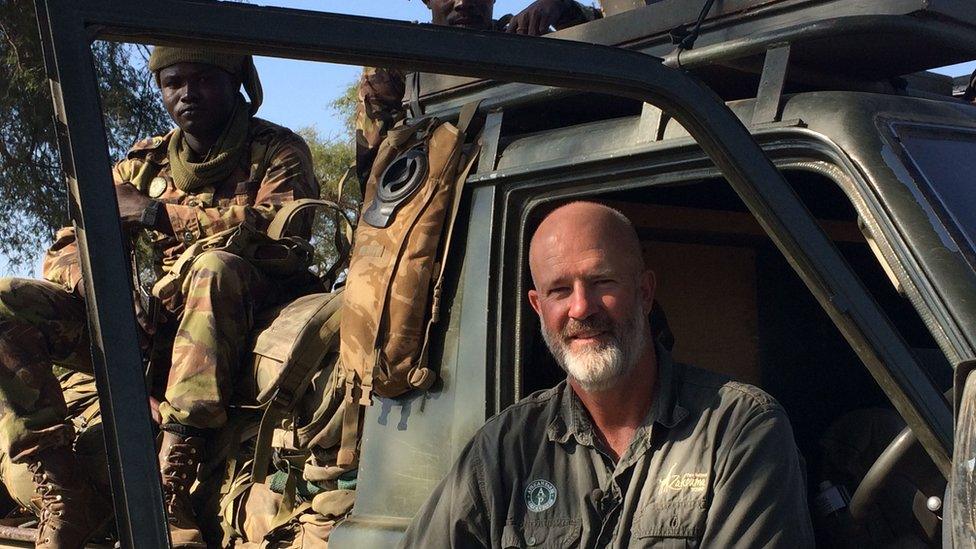
Zakouma National Park manager, Leon Lamprecht (R) with members of the Mamba Two team
Tens of thousands once lived in this reserve covering 3,800 sq km (1,470 sq miles), but for centuries it was the nearest place Sudanese horsemen could find ivory, much coveted by Arab traders along the Nile.
Originally they hunted with spears and swords, but modern AK47 assault rifles allowed killing on an industrial scale.
Janjaweed mercenaries from Dafur, in western Sudan, continue to be the biggest poaching threat, with heavily armed, military-trained raiding parties on horseback targeting the elephant herds for their tusks.
Zakouma has lost 90% of the 22,000 elephants it had in the mid-1970s.
War with Libya and the upsurge in demand for ivory reduced the population to 4,300 by the early 2000s, and the chaos of civil war cut that to less than 500 by 2010.
Rangers were being killed, animals massacred in large groups, and it looked as if Zakouma's elephants were heading towards extinction.
But in the past few years, an amazing transformation has taken place.
In less than a decade a private, non-profit organisation has turned its fortunes around.
African Parks manages some of the toughest to protect parks on the continent, and in Zakouma, at least, it has made incredible progress.
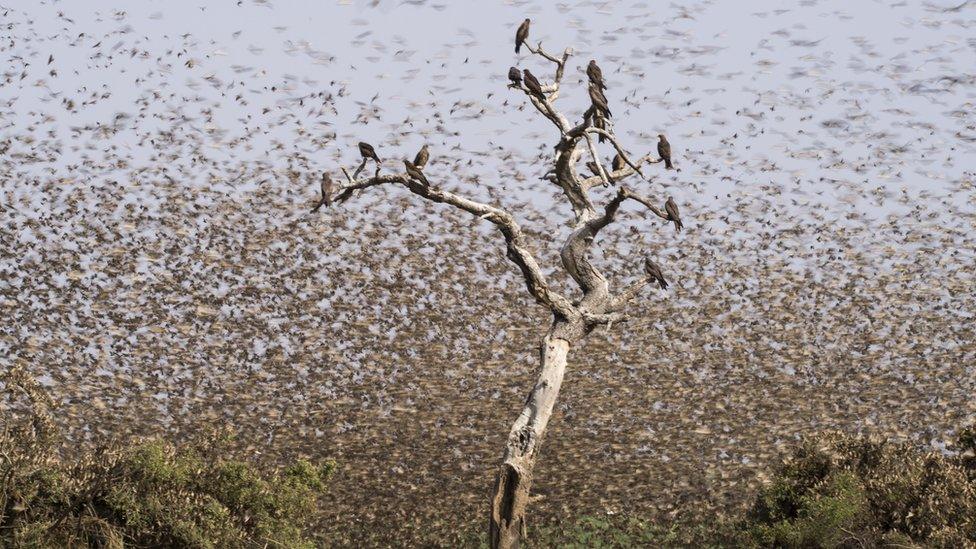
There are about 250 species of bird in the park
"We have rangers, and due to the threat that they face, they are military trained," says Zakouma park manager Leon Lamprecht.
"But they are ultimately doing law enforcement and not military operations. We are trying to stop poachers before they kill the assets that we protect."
African Parks calls what it does "delegated management in partnership with governments and local communities".
It manages 13 protected areas in nine countries at the invitation of governments that lack the staff or resources required to protect their own wildlife.
Zakouma hasn't lost an elephant in 18 months, or a ranger in five years, but it was an uphill struggle.
In 2012, a patrol of seven rangers discovered a poachers' camp in the park, and waited overnight for them to return. But as they carried out their morning prayers at first light, the poachers attacked them.
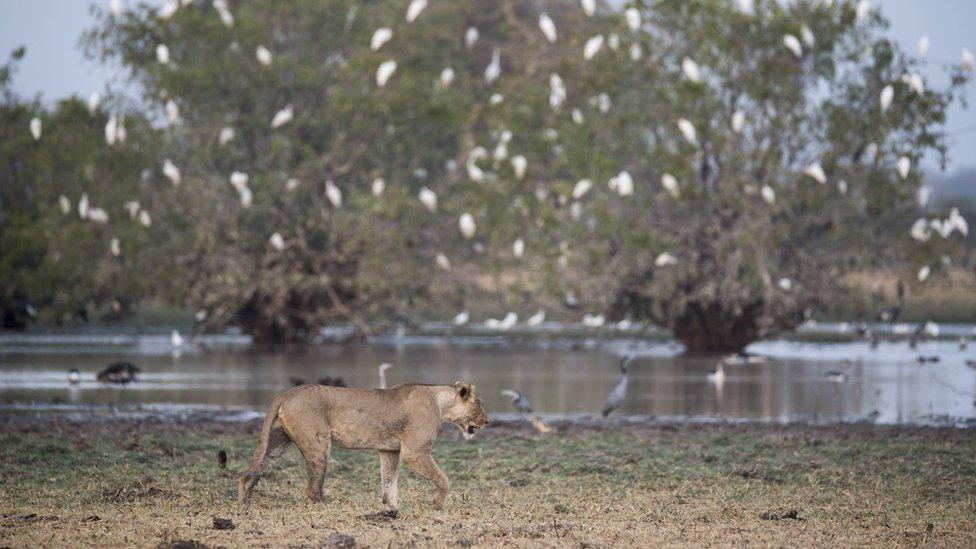
The Zakouma park, founded in 1963, is home to dozens of species of large mammals, including rhinos, leopards and lions
So African Parks introduced strict military-style training and tactics - to make sure rangers weren't caught unawares at the most vulnerable times of day - at dawn and at dusk.
"I think the term 'militarisation' of conservation isn't the greatest term. A better term is the 'professionalisation' of conservation," says the chief executive of African Parks, Peter Fearnhead.
Poachers, he says, are often highly militarised themselves, are highly trained, have equipment that is very freely available and don't abide by any of the laws and regulations of countries.
"So in order to make sure the execution of the law enforcement function is done professionally, you have got to have very, very professionally trained people," he says.

Adoum Allam is the sniper with Mamba Two patrol. He's 30, carries a long gun with a sight, and is doing the job his father did before he was killed by poachers, when Adoum was just eight.
He went through two weeks of selection, eight weeks of basic training and another four weeks learning to shoot.
"It's a very dangerous job, but I love doing it," he says.
It brings in money to support wife and four children, but he admits it is risky.
Around his waist he wears six leather belt-like straps adorned with solid, square, leather amulets each containing a verse from the Koran.
All the rangers wear these "waragars" to protect them from bullets.
Those worn by the Adoum Allam's colleague who mans the high-calibre weapon mounted on their vehicle are bigger and more numerous.
Chad isn't the first place that comes to mind when well-off Westerners plan a safari to see some African wildlife.
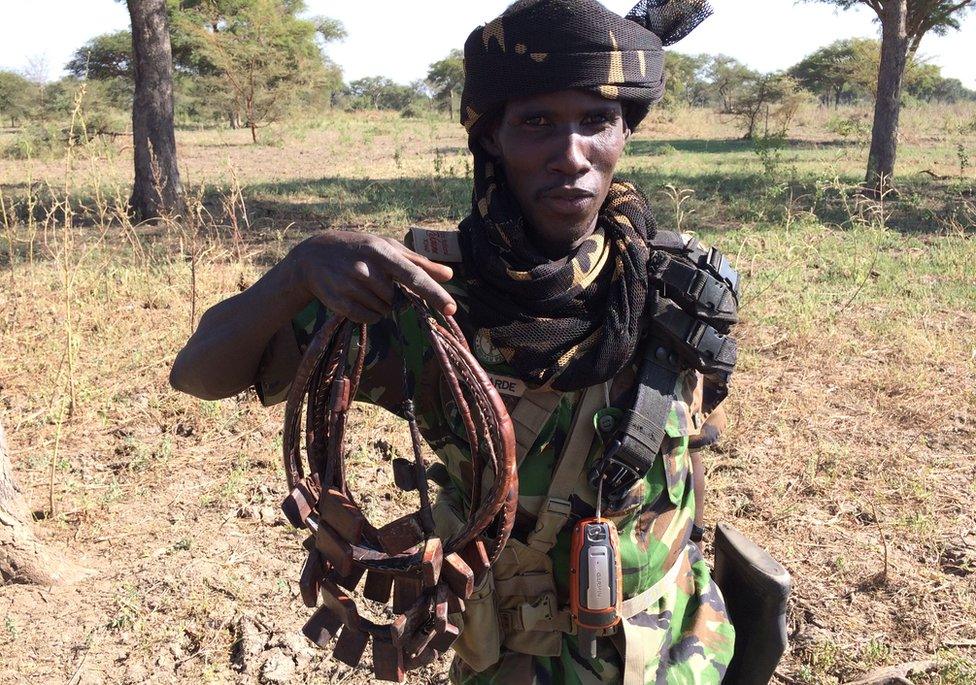
The Mamba Two patrol's sniper Adoum Allam with the leather amulets known as waragars
Those who've heard of this country that straddles the Sahara and central Africa, are more likely to think Boko Haram than luxury camp.
Lake Chad, on the country's western borders with Nigeria, Cameroon and Niger, has been blighted by the Islamist group.
But on this eastern side of Chad, high-end tourists are paying thousands of dollars a night to glamp out under canvas, watch the birds and the wildlife, and experience something exciting, different and adventurous.
"A typical park will cost African Parks anywhere between one and about $5m [£3.75m] per year just to keep going," says Peter Fearnhead.
"In order to be able to look after these parks, the resources needed - the costs of running parks and running them properly - are very, very high."
They are almost entirely donor-funded, with the European Union providing a huge chunk of the money.
Attracting top-dollar tourists is the ultimate aim across all the places African Parks manages - so they can start paying for themselves. But those most at risk are often blighted by war, or instability.
Even the Nomade wilderness camp at Zakouma - run during the four dry-season months of the year and booked up two years in advance - still pays only a third of its bills.
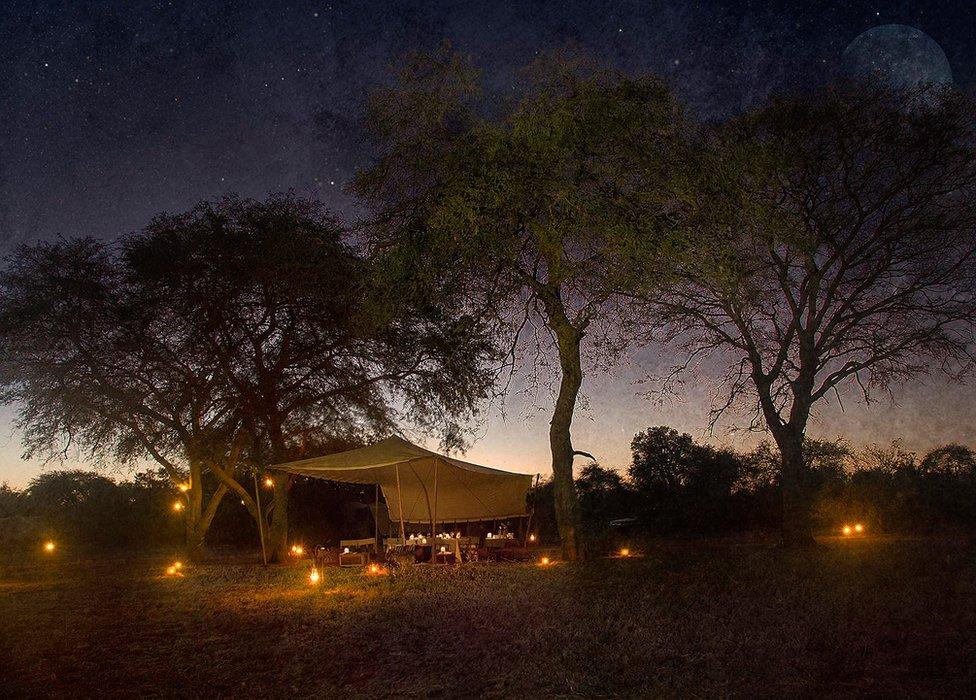
Guests can pay thousands of dollars a night to sleep under the stars at Camp Nomade
The EU and philanthropists don't just give money to protect the animals, but because of the stability and the wider development a successfully run park can bring.
Winning over the local community is the key to protecting it from poachers. Schools have been built, and jobs provided.
Now, a network of radios has been given to villages outside the park to provide an early warning system for the rangers.
"When you have people coming out of Sudan - the same people that have committed the atrocities in a place like Darfur - when they come to poachin Zakouma, they're not coming along with their American Express and paying for accommodation and food along the way," says Mr Fearnhead.
"They rape, they pillage, they plunder and at the end of it they poach as well.
"We provide security to people living around the park.
"We have a common enemy, and by aligning ourselves with the local people, we are able to overcome those forces."
It's going so well that next year African Parks will be moving six black rhinos to Zakouma from South Africa, where poaching is destroying herds.
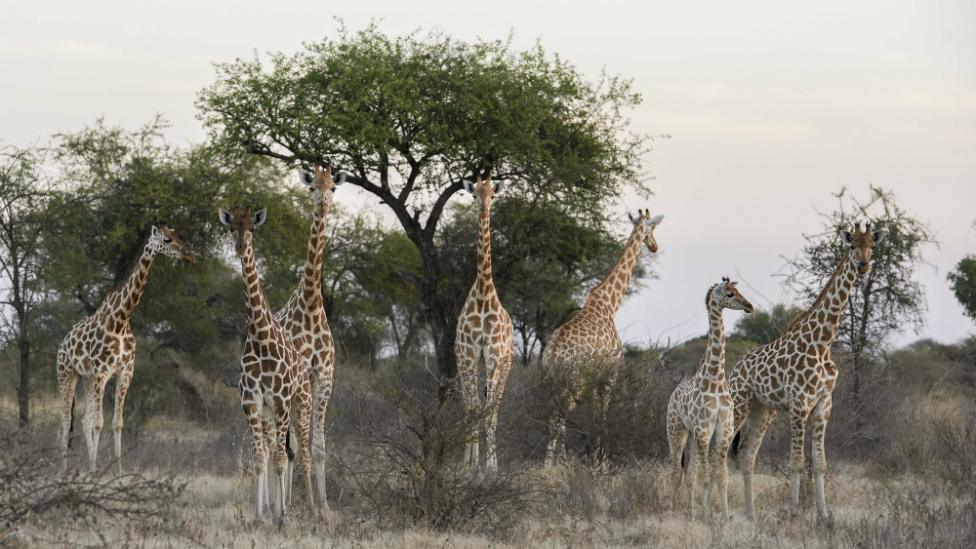
Zakouma has a population of 900 giraffes
The government of Chad is also happy with the arrangement.
"The number of animals is increasing and that's why we decided to sign a new agreement - it's a win-win result and we are very happy with it," says Ahmat Mbodou Mahamat, Chad's environment minister.
African Parks has been asked to dramatically expand the area it manages at Zakouma and take over another park in Chad's north-eastern desert, where a rare species of crocodile is greatly endangered.
"We must understand that the biodiversity is not being preserved just because we want to look at the animals. An equilibrium of the ecosystem also provides a better life for humans," the minister adds.
In the thick forest in southern Zakouma, the guards from Mamba Two patrol whispered for us to hang back and wait, as we were close to the herd.
It was 11:00, with the Sun high and the temperature rising, and we were worried the elephants would be under the shade of the trees, scattered and out of view in the forest.
But unexpectedly the landscape opened up into a wide green swathe of swampy grassland between strips of forest, and there they were - hundreds of them.
Zakouma is home to one of the biggest single herds of elephants you can find anywhere in Africa.
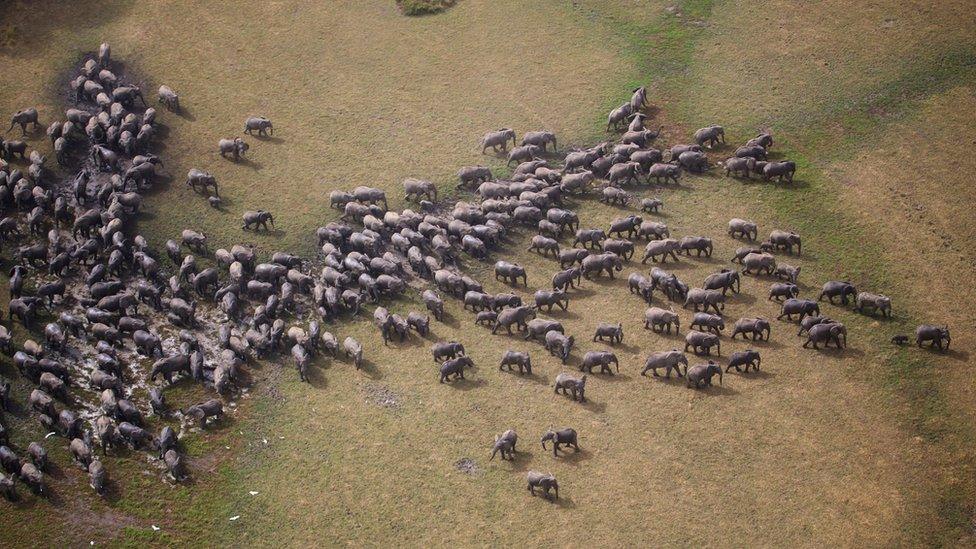
Some tore at the lush grass with their trunks and slapped at the water, others were sliding their huge frames into the mud and rolling on to their backs. The calves were having even more fun - one was perhaps just a month old.
In 2013 there was only one elephant under the age of three in Zakouma, but now there are 85.
With the wind at our faces and the animals unaware we were there, it was a magical experience.
Six years after the park came under new management, the amount of wildlife has tripled, the elephant population is finally increasing, and the tourists are coming.
"It is a war against poachers, but poachers are obviously just the first step in a chain of resource utilisation and resource extraction that is a massive economic force across the continent and globally," says Peter Fearnhead.
"We can label the individual that might be pulling a trigger and shooting an elephant as the poacher, but ultimately you are waging a war against the illegal wildlife trade which is a key component of the greater economic scourges that we face as humanity on this planet."